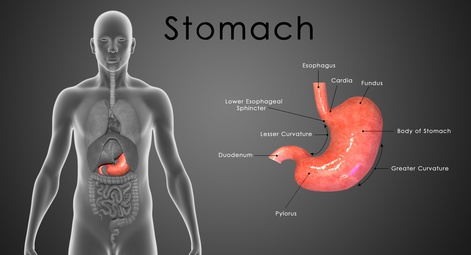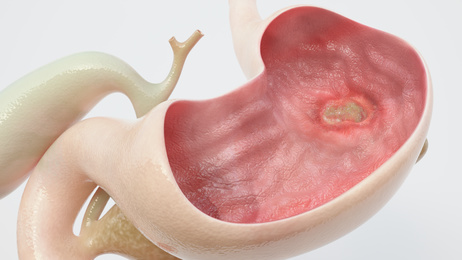Burning Stomach Pain – Causes and Conditions
There are various sensations that may be experienced in the stomach region. This is the upper left part of the abdomen and extends to the upper middle abdominal region. Discomfort, pain and a burning sensation are not uncommon in and around the location of the abdomen. However, these sensations cannot always be attributed to the stomach specifically.
There are many other organs in the region, including the left kidney, spleen, pancreas, gallbladder and intestines. Pain may also arise from other organs and structures around the stomach that are not part of the digestive tract like the lungs, kidneys and even the heart. It is therefore important that a burning stomach pain is assessed by a doctor.
Why does the stomach burn?
The sensation of burning in the stomach area, whether it is a feeling of mild discomfort or pain, is mainly caused by acid-related conditions. This is not always isolated to the stomach. It may extend to the neighboring organs, like the esophagus and duodenum of the small intestine. Other digestive and non-digestive conditions may also cause a burning sensation in the region of the stomach.
The stomach produces and holds powerful substances like stomach acid and digestive enzymes. Although these fluids do not usually damage a healthy stomach, it can be harmful in certain conditions. The acid and enzymes can cause inflammation of the esophagus, stomach or duodenum. Typically it causes a burning pain due to the action of these acid and enzymes on the gut tissue. However, a burning sensation can occur for other reasons even without acid damage.
Causes of Burning Stomach Pain
The stomach is a specific digestive organ that lies after the esophagus and before the duodenum of the small intestine. However, many people also refer to the abdomen as the stomach. While this is anatomically incorrect, it is important to differentiate between the burning stomach pain and a burning abdominal pain.
Esophagus, Stomach and Intestines
Most conditions that are referred to as a burning stomach involve the lower parts of the esophagus, the stomach and the duodenum which is the first part of the small intestine. Gastritis, peptic ulcers and acid reflux (gastroesophageal reflux disease) are by far the three most common conditions that contribute to the burning stomach feeling. These conditions are partially caused by the gastric acid and stomach enzymes which are also the major aggravating factor.
Gastritis is inflammation of the stomach wall. Like peptic ulcers, it is mainly caused by H.pylori infection and the excessive use of drugs like NSAIDs. Both the infection and drugs weakens the mucus barrier that lines the stomach thereby exposing the stomach wall to the acid and enzymes. Similarly in gastroesophageal reflux disease (GERD), the backward flow of stomach acid into the esophagus can cause tissue injury and damage.
Other Digestive Causes
Various other conditions can also be responsible for stomach discomfort or stomach pain although the three conditions above are the more likely causes of a burning stomach pain. Other gastrointestinal causes may include :
- Stomach: hiatal hernia
- Small intestine: blocked bowel (small intestine obstruction)
- Large intestine: constipation, blocked colon (large intestine obstruction), inflammatory bowel disease, IBS
- Pancreas: pancreatitis, pancreatic cancer
- Liver: hepatitis and other causes of liver pain
- Gallbladder: gallstones, cholecystitis
Other Non-Digestive Causes
A large part of the stomach is tucked under the left rib cage. Therefore other causes of pain under the left rib cage, left upper abdomen and middle upper abdominal region need to be considered when assessing burning stomach pain. Some of these causes may be unrelated to the digestive system.
- Muscles: Chest wall and abdominal wall muscles may also be responsible. Strenuous physical activity, excessive coughing and prolonged rapid breathing can strain these muscles. Muscular pain is often described as a burning pain.
- Heart and Blood Vessels: Angina pectoris or a heart attack are some of the more common causes. Although this is typically a crushing pain, it can sometimes present as a burning pain. Other conditions like pericarditis and an aortic dissection may also be responsible.
- Lungs: The lower lobe of the left lung sits close to the stomach and conditions affecting this part of the lung can be mistaken for stomach pain. Conditions like pneumonia and pleuritis also need to be considered.
- Spleen: The spleen sits next to the stomach. Spleen pain is more likely to occur with conditions like a rupture or infarct.
- Kidneys: The left kidney also sits close to the stomach but towards the back. Kidney conditions like kidney stones and kidney infections may also cause pain in this area. Often it is described as a burning pain.
- Diaphragm: The stomach is tucked under the diaphragm on the left side. Conditions like a diaphragmatic abscess may cause burning in the stomach region.
- Peritoneum: Inflammation of the peritoneum (peritonitis) while lines the abdominal cavity may also present as a burning pain.
- Chest and Abdominal Wall: Apart from the muscles, various skin and nerve conditions may also cause burning and pain in the stomach region, as is seen with shingles.
After Eating
Pain on its own can be a difficult symptom to diagnose if there are no other symptoms. The onset and exacerbation of pain after eating is usually a sign of a digestive problem. It is more likely to occur with gastritis, acid reflux and peptic ulcers. However, the pain may also worsen with hunger. Pain after eating is also commonly seen with pancreatitis and gallstones. The latter tends to be worse with eating oily meals.
Read more on stomach pain after eating.
During Exercise
Abdominal pain after exercise is a common problem and mainly due to the abdominal muscles being strained. However, upper abdominal pain after exercise if accompanied by chest pain could also be a sign of heart-related conditions like angina pectoris and may even be a heart attack. Acid reflux can also worsen during and after exercise in some people.
With Belching
Belching is a common symptom with most digestive conditions. When a burning stomach pain occurs with belching, it may be gastritis, peptic ulcers, food intolerances, a hiatal hernia or acid reflux. Belching is unlikely to occur with non-digestive conditions. Sometimes spicy foods or carbonated drinks can cause belching and stomach pain if conditions like gastritis or peptic ulcers are present.








